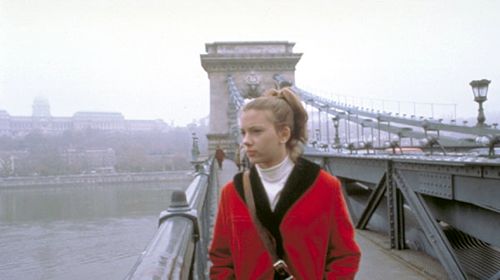

The emotional intensity in An American Rhapsody comes from its writer/director Eva Gardos. Aside from some minor changes, this is the story of her life. Gardos lovingly retells it in cinematic form, framing it as the classic tale of a teenager's search for identity (thematically similar to The Cider House Rules). For Suzanne (Scarlett Johansson, Ghost World, My Brother the Pig), it is a question of her heritage. She feels torn between two cultures, and feels the need to explore her past because of the friction in her current life. What prevents An American Rhapsody from achieving its full potential is a reliance on tear-jerking moments that actually detract from some of the feeling in the film.
Suzanne's parents, Peter (Tony Goldwyn, Bounce, The 6th Day) and Margit (Nastassja Kinski, The Claim, Town & Country) escaped from Hungary when Suzanne was an infant. Because of extenuating circumstances, Suzanne was not able to escape with them, causing Peter, and especially Margit, extreme anguish. Jeno (Balasz Galko, Tunderbomb) and Teri (Zsuzsa Czinkoczi, The Seventh Room) raise Suzanne as their own, not telling her about her true parents. At the age of six, Suzanne's relatives whisk her away from Hungary and to America, where she has to adjust to a whole new way of life. She is comfortable, but clearly misses Teri and Jeno. She does not even call Margit 'mother.'
An American Rhapsody then flashes forward to Suzanne as a rebellious teenager. She feels repressed by her mother, who is overprotective of Suzanne for obvious reasons. Suzanne resents her mother's actions, and they frequently clash. She longs to see her 'first family,' and although she is as American as apple pie, she feels she is missing a large part of her life. The culmination of this angst is a trip to Hungary to rediscover her past and hopefully her future. An American Rhapsody is less about a plot than about self-discovery. Like everybody else in the world, Suzanne wants to know where she belongs. The answer is pretty obvious, and although there is a high level of emotion throughout the film, it begins to feel hokey once she is in Hungary.
What makes this movie worth watching are the performances. There are great performances by the entire cast. Even Kelly Endresz-Banlaki, who portrays Suzanne at age 6, manages to supercede the typical cutesy performance that child actors give. Johansson is a pleasure to watch, channeling confusion, rebellion, resentment and love all at the same time. This, along with her vastly different performance in Ghost World, shows that she could be the next 'indie it' girl. Kinski is the only person who gives something of an overwrought performance, and the story explains this away in an almost gimmicky sort of way. Although it is predictably and at time mushy, Gardos still tells a compelling story; one that is worth watching.